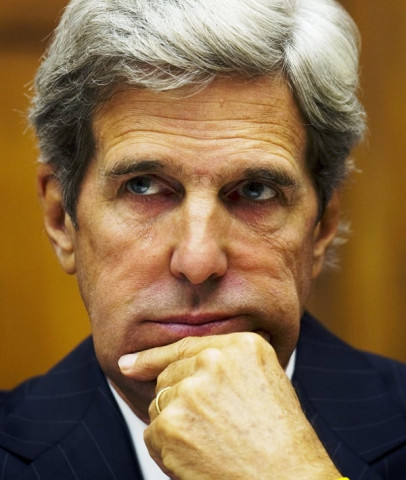John Kerry: good for Pakistan?
Pakistan has reason to like Kerry. He knows a lot about US foreign policy in general and about Pakistan in particular.

Pakistan has reason to like Kerry. He knows a lot about US foreign policy in general and about Pakistan in particular. PHOTO: AFP/FILE
Pakistan has reason to like him. In September this year, when Senator Rand Paul asked the US Senate to pass his amendment asking for all assistance to be cut off to Pakistan on the question of Dr Shakeel Afridi, Senator Kerry took him on, challenging his contention that Pakistan was not a friend of America and rebuked him for making his remarks without ever once having visited Pakistan. One sentence in particular was noted by the foreign policy enclave in Islamabad. Senator Kerry asked Rand Paul: “Pakistan is losing men fighting militants in northwestern part of the country and you want to cut off aid?” He informed the Senate that “US troops in Afghanistan get some supplies through the supply routes in Pakistan and that the US has been able to decimate the al Qaeda with Pakistan’s help”.

Earlier in 2011, President Barack Obama sent Senator Kerry to Pakistan to talk to the power centres of Pakistan to break the deadlock in Pakistan-US relations. He was to address the concerns of Army Chief General Ashfaq Parvez Kayani and ensure that “Pakistani anger over the US raid to kill Osama bin Laden in Abbottabad does not subvert security cooperation”. As his visit unfolded, the US press noted that “Pakistan is vital to US efforts to combat Islamist militants and to efforts to stabilise Afghanistan, where US forces depend on Pakistani supply lines for water, food, fuel and other essentials”.
The Pakistan-US equation dipped perilously after the Bin Laden killing. Pakistan’s Chairman of the Joint Chiefs of Staff Committee, General Khalid Shameem Wynne, cancelled a five-day visit to the US. Senator Kerry, thereafter, became a part of the diplomacy that led to the reopening of the Nato supply route in 2012. He was seen as a friend of Pakistan and was effective in moderating views on both sides of the quarrel till they were ready to place their relationship on a new footing. He continued to emphasise the Pakistani point of view while putting forward the concerns of the Obama Administration. Speaking a day after two suicide bombers killed 80 people at a Pakistani paramilitary academy, he said Pakistan was “a victim of extremism and faced its own tough decisions”.
He was in Islamabad again in May 2012 asking for a “reset” of Pakistan-US relations. The US was not yet sure about the option of offering apology for the Bin Laden incident but it was clear that Kerry’s diplomacy was unleashed to test the waters in Pakistan before flexibility was adopted on the issue. His 24-hour visit was meant to soothe Pakistani anger at not being informed about the raid because the US was keeping the situation in Afghanistan on top of its ‘endgame’ agenda. He gave the first signal for the positive developments that followed, climaxing in American acceptance of Pakistan’s concerns about post-withdrawal Afghanistan.
Now that some kind of dialogue between Kabul and the Taliban is in progress, Pakistan has to reassess its position and be ready to readjust to a post-withdrawal situation in its neighbourhood. At the people’s level, reflected in the national media, anti-Americanism is rampant but our ‘strategic enclave’ must also be vigilant over this hate wave becoming simply a label for isolationism. Pakistan’s economy is hurtling towards a crisis it may have not have faced before. Its relations at the global and regional level must reflect Pakistan’s need for support in facing up to the threat of terrorism now virtually beyond its control. Pakistan’s law-enforcement will be critical in the coming days and its personnel will need training that the international community is in a position to provide.
Published in The Express Tribune, December 26th, 2012.














COMMENTS
Comments are moderated and generally will be posted if they are on-topic and not abusive.
For more information, please see our Comments FAQ